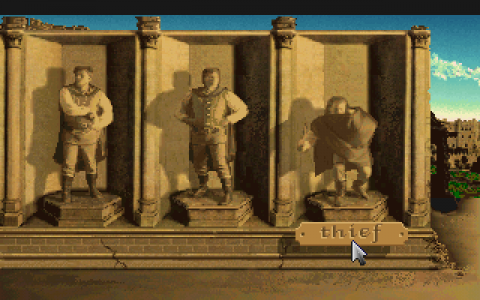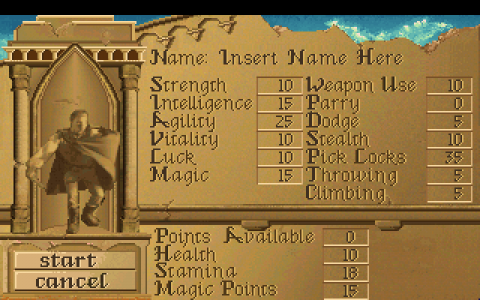Overview
Quest for Glory I: So You Want to Be a Hero (originally released as Hero's Quest) is a lighthearted adventure-RPG hybrid developed and published by Sierra. The original Hero's Quest (released in 1989) featured a text parser and EGA graphics; the 1992 Quest for Glory remake brought the game into the point-and-click adventure world with VGA graphics and a mouse-based interface found in other Sierra adventure franchises of the era. The name of the series was changed due to a trademark conflict with the Milton Bradley board game Hero Quest.
Corey Cole, game programmer and Lori Ann Cole, game designer, husband and wife respectively, created the Quest for Glory series. Corey worked as a programmer for Sierra On-line, a company responsible for adventure game franchises such as King's Quest and Leisure Suit Larry. Because of Lori Ann's disinterest in adventure games' typical design, she collaborated with her husband to combine her love of role-playing games with adventure games resulting in the Quest for Glory series. What set the Quest for Glory series apart from its predecessors were these RPG elements implemented with adventure style gameplay.
Story
In this first installment of the Quest for Glory series, the player takes on the role of a nameless adventurer who has just set out on his own after graduating from the Famous Adventurer's Correspondence School for Heroes. In the opening sequence of the game, the hero arrives in the Germanic town of Spielburg (literally translated: "game town"), lured there by a notice in his hometown that the Baron of Spielburg was looking for a hero--no experience necessary. He soon learns that the valley has been put under a curse, and that a prophecy foretells a hero breaking the spell:
Come a hero from the East
Free the man within the beast
Bring the child from out the band
Drive the curser from the land
From a humble beginning raking horse manure and fetching lost items, the hero eventually fulfills the prophecy, encountering various characters and creatures, saving Spielburg and becoming a hero. During the credit sequence, the hero is whisked away on a flying carpet with friends Shameen, Shema, and Abdulla Doo to their homeland of Shapeir, where Quest for Glory II: Trial By Fire takes place.
Gameplay
As a true adventure-RPG hybrid, Quest for Glory I combines classic graphic adventure gameplay with RPG elements such as statistics, a combat system, a day-night cycle, and classes. Before starting the game, the player chooses from playing as a Fighter, Magic User, or Thief. Hybrid classes are possible in that it's possible for a Thief or Fighter to use magic, or a Fighter or Magic User to sneak, if points are given to that stat at the beginning; other than having a slight difference in what points are awarded for what action (for example, the Fighter gets points for killing certain monsters while the Thief gets points for stealing), the classes mostly encourage the player to truly roleplay by thinking about how their character would solve a problem. The Fighter starts the game with a sword and generally uses brute force to get things done; this straightforward class is recommended for beginners. The Magic User, on the other hand, uses his wits to solve problems, casting spells to open passages or fetch objects more often than casting fireballs in battle. The Thief solves problems through stealth and cunning, and the use of special tools such as the lockpick to get by obstacles. The Thief can also break into the homes of citizens at night to steal valuables to fund being a hero.
Especially in the beginning, the player must deal with some of the mundaneness of being a hero: he must eat at least once a day and sleep for several hours each night or face exhaustion. The hero starts off with little money and must work to earn gold since even the weakest monsters are tough to beat at first. However, starting the hero off raking horse manure and ending with becoming a hero and honored by the entire town makes for a game that truly feels like a journey.
The game is mostly nonlinear in that many tasks can be performed in any order, and although the game keeps track of the number of days the quest takes, there is no set time limit. The game can be beaten without "driving the curser from the land", for example, though not without sacrificing points.
The EGA release is played using a text parser to look at things, speak to people, and interact with the world, using commands such as "ask about Baron" or "take mushrooms". This interface is widely criticized as being unintuitive and occasionally frustrating as the exact wording must be used to successfully complete a puzzle; if the player has the right idea but the wrong wording, it can take much longer to figure out the proper solution. The VGA remake of the game did away with the text parser and utilized the graphical interface with context icons that represented various ways of interacting (using the mouth icon to talk to people, the eye to look at things, etc.) by then familiar to adventure game fans.
One of the great innovations of the game was to include an option at the end of the game to export a character for use in the sequel. When importing the player could receive a slight advantage, especially if they went through the trouble of maxing all of their hero's stats. Playing through the entire series of five games and bringing the same character through all of them is an epic journey indeed.
List of Magic Spells
This is the original list of spells that all future Quest for Glory games build upon.
Zap: This spell is cast upon a weapon in order to charge it with magical power and increase attack. The Magic User starts the game with this spell.
Open: Can be used to open locked doors, chests, or other closed objects that the hero might otherwise not be able to open.
Fetch: Brings a faraway object to the caster, though it is limited to small objects.
Flame Dart: The caster shoots a small ball of fire at the target. A spell used in battle, or to light fires.
Detect Magic: A spell used to reveal enchantments.
Trigger: This spell activates magical traps and other enchantments allowing the caster to avoid damage from traps or find hidden objects.
Calm: Casting this spell makes the area into a peaceful place preventing many monsters from attacking. This spell should always be used outside of battle; if cast while engaging a monster, it will cause the monster to become clear-headed and slaughter the player hero easily.
Dazzle: Short for Erasmus's Razzle Dazzle, this spell can temporarily blind an opponent and can be used in combat to prevent the enemy from attacking for a short period of time.
 Choose Your Hero
Choose Your Hero- Fighter: Battle-ready weapon specialist whose main statistics are Strength, Weapon Use, and Vitality; smash, throw, or slash a way through most problems as the Fighter.
- Magic-user: Spell weavers predominantly utilizing the Intelligence and Magic statistics; the brains of the three classes, Magic-users make up for what they lack in brute physicality with mind over matter tactics.
- Thief: Crafty rogues who depend mainly on the Agility, Stealth, and Pick Locks statistics; Thieves find clever means to exploit the surroundings and silently make it out of situations alive and with the treasure.

Statistics determine the hero's effectiveness in battle, gambling , etc. Each statistic starts at a predetermined number when the player creates his hero; that number is based on the hero's class, e.g. thieves start with 25 Agility, the highest Agility of the three classes. 50 points are available to spend to increase certain statistics on the creation screen when the player creates his hero.
While playing the game, the hero may increase his statistics by engaging in combat, casting spells, gambling, as well as other activities. If no points exist in a statistic, that statistic cannot be improved through practice.
- Strength: affects weapon damage in battle, carrying capacity, maximum health, ability to react to certain in-game situations such as breaking durable objects.
- Intelligence: affects spell casting, maximum magic points, sometimes affects solving puzzles.
- Agility: affects defensive actions like dodge, certain thief skills, maximum stamina points.
- Vitality: affects damage resistance, maximum health, Stamina.
- Luck: affects many actions, random effects in particular, and can be increased by many different actions.
- Magic: affects spell casting ability, effectiveness, maximum magic points.
- Weapon Use: affects damage dealt with weapons in combat.
- Parry: affects ability to block with either a shield or weapon, lessening damage taken.
- Dodge: affects ability to avoid attacks.
- Stealth: affects ability to sneak, hide, remain undetectable by enemies.
- Pick locks: affects ability to open locks, disarm traps.
- Throwing: affects ability to throw projectiles such as daggers.
- Climbing: affects ability to climb objects such as trees.
- Health: represents the hero's life points which if depleted, the hero dies; the health points are determined by one-third of Strength plus two-thirds of Vitality.
- Stamina: represents the hero's physicality; reduced by certain physical activities, e.g. Climbing; determined by one-half of Agility plus one-half of Vitality.
- Magic Points: represents the amount of magical energy the hero possesses; determined by one-third of Intelligence plus two-thirds Magic.
Starting Stats by Character Class
Fighter
- Strength: 25
- Intelligence: 10
- Agility: 15
- Vitality: 15
- Luck: 10
- Weapon Use: 20
- Parry: 15
- Dodge: 10
- Throwing: 10
Magic user
- Strength: 10
- Intelligence: 25
- Agility: 15
- Vitality: 15
- Luck: 10
- Weapon Use: 10
- Dodge: 15
- Magic: 25
Thief
- Strength: 10
- Intelligence: 15
- Agility: 25
- Vitality: 10
- Luck: 10
- Weapon Use: 10
- Dodge: 5
- Stealth: 10
- Lockpicking: 10
- Throwing: 5
- Climbing: 5
Notable Characters
- The Hero: Quest for Glory's protagonist
- Baba Yaga: the antagonist who curses Baron von Spielburg and his family
- Baron von Spielburg: leader of the good forces of the land surrounding the town of Spielburg
- Elsa von Spielburg: daughter of Baron von Spielburg and kidnapped by Baba Yaga
- Erasmus: the strange but friendly wizard who aids the hero
- Fenrus: the rat familiar of Erasmus, Fenrus possess some magical ability and can speak
- Kobold Magic-user: similar to Gollum, this cave dweller protected his treasure with magic
- Shameen: the Katta (cat-like race) innkeeper of Spielburg, he fled his homeland when an evil wizard appeared
- Sheema: the wife of Shameen, she cooks and serves food to patrons of her husband's inn
- "Main Title -- Hero Selection"
- "Spielburg - Katta's Tail Inn"
- "Hero's March"
- "Zara's Shop"
- "The Thief"
- "Music Box"
- "Erana's Peace"
- "'Enry the 'Ermit"
- "Battle Theme #1"
- "Battle Theme #2"
- "Stable Medley"
- "Healer"
- "Graveyard"
- "Goblin Ambush - Dryad"
- "Fairy Ring"
- "Erasmus' Castle"
- "Kobold Cave"
- "Freeing the Baronet"
- "The Baron's Castle"
- "Yorick"
Log in to comment